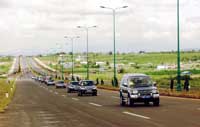
| Highways need $1.3b per year to expand | |
HA NOI — Viet Nam needs to raise an estimated US$1.3 billion a year, or between 1.5 to 2.2 per cent of Gross Domestic Product, to build effective expressways, a new Transport Ministry study shows. The study’s results were unveiled at a workshop held to discuss mobilisation of necessary capital in Ha Noi yesterday. Titled the Viet Nam Expressway Development Study workshop, it was held jointly by the Ministry of Transport and the World Bank. "Modern infrastructure should go one step ahead to pave the way for socio-economic development," Deputy Prime Minister Nguyen Sinh Hung told the gathering. "There is a great demand for funding from international donors for construction and technical assistance for capacity building in management, operations and maintenance," he said. A World Bank study argued that private capital should play a greater role in both financing and developing expressways. World Bank Viet Nam acting country director Martin Rama said planning the development of expressways was a long-term undertaking and a clear set of short-term priorities focusing on limited financial and institutional resources were important. The World Bank study shows that Viet Nam’s rapid economic growth continues to create new demands for transport infrastructure and services. The high rate of urbanisation; increased traffic accidents; new capacity constraints and a heavy increase in the requirement to preserve assets created further challenges, the report says. T he workshop was told that the Ministry of Transport is to submit the Viet Nam Expressway Network Development Plan to 2020 to Prime Minister Nguyen Tan Dung for approval. The plan includes a national network of 20 expressways with lengths totalling 5,873km. It proposes that money to build the network be mobilised from the State budget in Government-guaranteed loans and borrowings as well as public-private partnership. An overview of the master plan was provided to participants at the workshop. The participants also discussed the international experience and its implication for expressway finance and management in Viet Nam. | |
| VNS |
